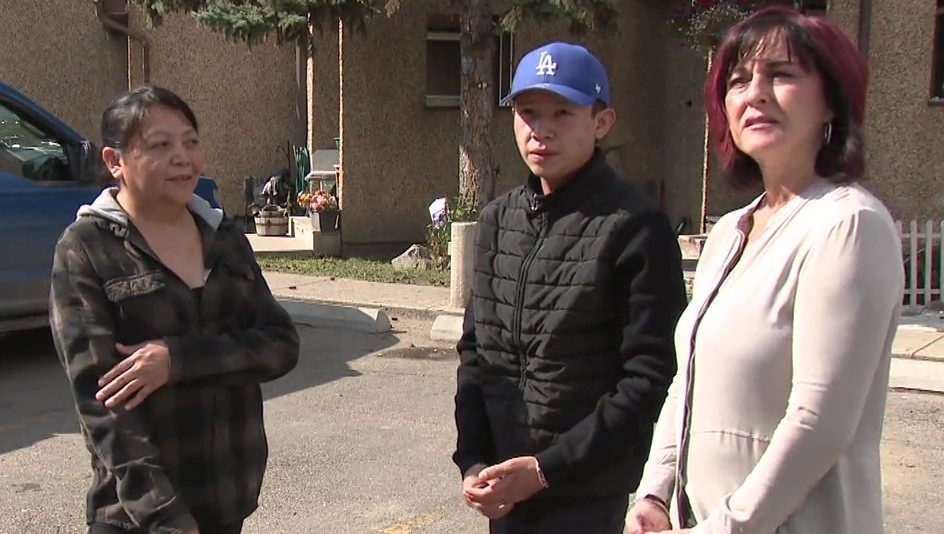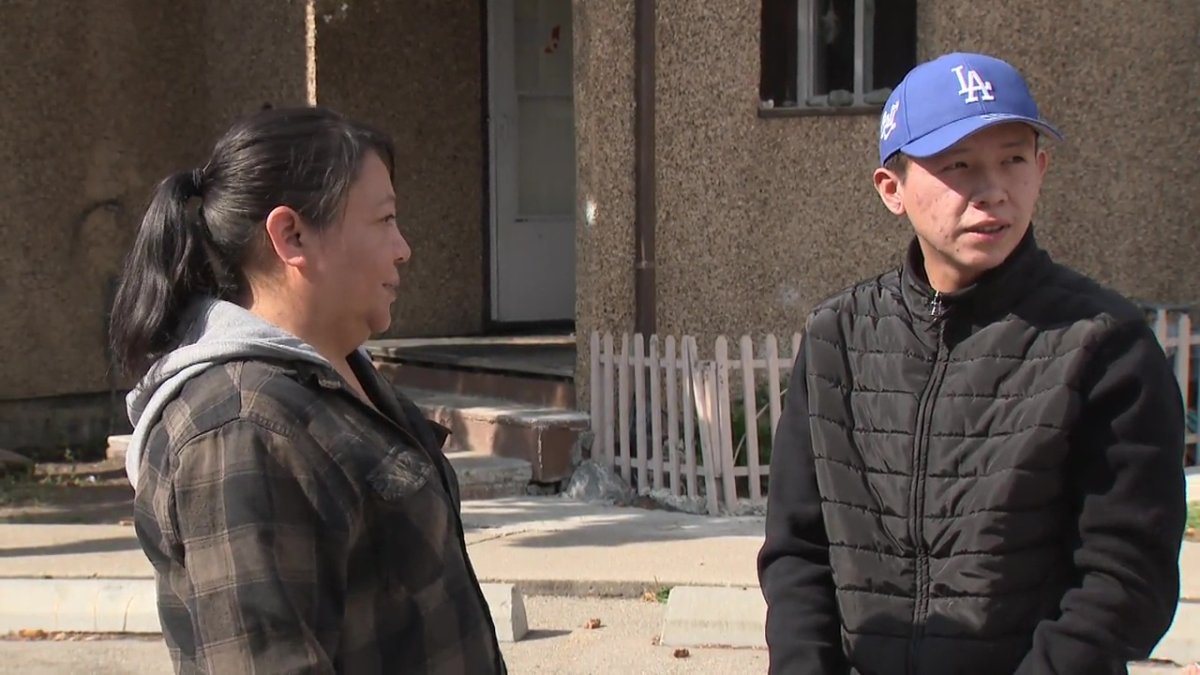A family that feels Alberta’s justice system failed to do its duty is now pursuing another avenue in their quest to hold to account an Edmonton Police Service officer who kicked a young man in the head, leaving him with life-altering injuries.

“The police shouldn’t get away with what they did to me or anyone. If they do something, they should at least own up to their actions,” Pacey Dumas said on Tuesday.
The young man has come a long way from being in the ICU for nine days after intensive brain surgery, and while he is now working and raising a daughter, the impact of that kick endures.
The Dumas family is taking on the challenge of a private prosecution of a police officer in Alberta, after Dumas was injured by a EPS officer responding to a fight at a home in west Edmonton in December 2020.

Alberta’s police watchdog, the Alberta Serious Incident Response Team (ASIRT), called the actions of the officer, Const. Ben Todd, unreasonable hasty and violent, and said there were reasonable grounds to believe Todd had committed a criminal offence.
ASIRT had recommended charges but the Alberta Crown Prosecution Service (ACPS) declined to move forward with the case, saying it felt would not have a reasonable chance of prosecution.
Heather Steinke-Attia, legal counsel for Pacey Dumas and his mother Irene Dumas, said that happens far too often in Alberta.
“There are too many cases, that I’m aware of, where ASIRT has recommended criminal charges and the prosecution service chooses not to follow through,” she said.
“The family doesn’t want to see this happen to another family. They want justice for themselves. They don’t want this shoved under the carpet. They want accountability. They want an apology.
“They want to make sure they can do whatever they can, so that this doesn’t happen to someone else.”
To that end, the family is going to appear before a judge at the Alberta Court of Justice next month to lay out its argument on why the case should be prosecuted: either by the Crown, or more unusually, by a lawyer like Steinke-Attia herself acting in the Crown’s place.
“We will hopefully be allowed to present our evidence to a judge and thereafter, the process — which is a path less travelled at this point, to my knowledge — would require the Crown service to decide if they are going to in fact take up the prosecution or if we have other means of applying to the Attorney General to actually prosecute privately. ”
The family is seeking an aggravated assault charge against Const. Todd.
Dumas said he’s feeling mixed emotions about getting his day in court.
“I don’t know what’s going to happen. That cop should get charged. If that was someone else or if that happened to the cop, he would have got charged,” Dumas said.
“So where’s the responsibility and how is he going to be accountable to own up to his actions?”
The day that changed Pacey Dumas’ life forever
The incident happened the morning of Dec. 9, 2020, when police were called about a fight involving a man with a knife near 62 Avenue and 178 Street.
According to the ASIRT report and the family, when police arrived, Dumas – then 18 – and his older brother Blair were ordered to come out of the house and willingly did so, laying on the ground.
According to the officers interviewed by ASIRT, Dumas followed directions to start crawling on his belly towards the officers.
According to the ASIRT report, officers claimed Dumas told them he was the person with a knife and Dumas reached into his pockets or waistband. The officer then told Dumas to take his hands out or he would kick him.
Todd then kicked Dumas in the face “as if you’re kicking a soccer ball” according to witness reports. Dumas was knocked unconscious and began to bleed, said ASIRT.

While police officers are allowed to use deadly force if they believe it’s necessary to save their lives or the lives of others, ASIRT questioned if the force was proportionate and if the officers were in danger.
Dumas weighed 90 pounds and was already on the ground. ASIRT also noted his proximity to the officer was a result of the officer’s orders.
Neither brother was ever charged and no knife was found.
Dumas was rushed to hospital and diagnosed with critical intracranial injuries: a subdural hemorrhage and midline shift.
Dumas underwent emergency surgery where a significant portion of his skull was removed to relieve pressure on his brain. He spent nine days in the ICU and ASIRT said the effect of his injuries will be long lasting, if not permanent.
To this day, Dumas said he can’t remember what happened that day, nor can he recall being in the ICU.
“They said I had a breathing tube and everything. I didn’t remember my whole stay at the hospital, only the day I got released,” he said.
His brother Blair was there during the kick and had been in handcuffs on the ground.
The family said his mental health spiralled after the incident as he felt he couldn’t protect his younger brother. He died by suicide in March 2022.
“We’ve been through so much, me and my family, and we’re still going through so much right now,” Dumas said.
“How are we supposed to move forward?”
Steinke-Attia said the ACPS’s refusal to prosecute the case left private prosecution as one of the few alternatives.
Dumas also launched a civil lawsuit against Todd and the Edmonton Police Service in 2021.
Crown explains reasons for not pursuing charges
- London Drugs remains closed, says it is reviewing billions of lines of data
- Trump trial hears recording discussing hush money scheme: ‘What do we got to pay?’
- How toy guns brandished by Ontario youth in ‘assassins game’ is prompting real fear
- Parents of 3-month-old baby killed in wrong-way Highway 401 crash also hurt
On Tuesday, the Alberta Crown Prosecutors Service laid out in detail to Global News why it decided not to pursue the Dumas case.
“While the circumstances outlined by ASIRT in this matter are disturbing, the role of the ACPS is to assess the triable evidence and provable facts in making a determination as to whether there is a reasonable likelihood of conviction,” the Crown said.
The decision to not recommend charges was not an endorsement of the officer’s actions or their tragic consequences, it said — rather, the role of the ACPS is to provide an objective assessment of the viability of potential charges based on all the relevant facts.
The ACPS standard for prosecution is a higher than that of the police, it said, adding the courts have an even higher standard of proving guilt beyond a reasonable doubt.
“These checks and balances mean that it is possible for one standard to be met, but for the case not to proceed at the next level due to the more onerous standard,” the Crown said.
In the case of Dumas, the ACPS said a prosecutor reviewed the investigation and surrounding circumstances and concluded that the charges did not meet its standard for prosecution.
To proceed with a charge, the prosecution must be satisfied a case meets two fundamental tests: is there a reasonable likelihood of conviction and is there a public interest.
In addition to that, when officers are involved, they must look at Section 25 of the Criminal Code, which authorizes police to use as much force as is necessary in an arrest so long as it is not excessive.
“In order to secure a conviction against a police officer, the court must be satisfied beyond a reasonable doubt that the force was in fact excessive. This is necessarily a very high burden to meet,” the statement from ACPS said.
“Through a comprehensive review of this case, which included the retainer of an independent expert on the use of force, ACPS determined that the first step of the standard for prosecution (reasonable likelihood of conviction) cannot be met.”
The Crown said the Dumas file was handled by the Calgary office of its Appeals and Specialized Prosecutions branch.
Steinke-Attia said the Crown’s position was countered by the report by ASIRT executive director Michael Ewenson.
“He believed that the evidence could be believed by a judge and lead to a conviction. I believe that’s what his decision, his opinion could be read as,” she said.
Steinke-Attia noted ASIRT is an independent oversight body comprised of their own set of experts on use of force, including officers seconded from several police agencies, including Edmonton and Calgary police.
“I’m hard pressed to believe that the Crown Prosecution Service can find any cause not to allow this to go before a court in the public interest,” she said.
“There is a substantial amount of public interest in what is happening in this case and in others (where) ASIRT recommended charges that don’t proceed.”
Pacey’s mother Irene Dumas wants to the case to go to court and see the Edmonton police officer take responsibility for his actions, which left her son maimed and she says led to her other child dying.
“Just because he works for Edmonton Police Service, he could get away with it? I don’t think so,” she said, adding officers need to be held accountable.
“We want the justice not just for us, but everybody else.”
The case is set to be heard before an Alberta Court of Justice judge on Oct. 13.





Comments